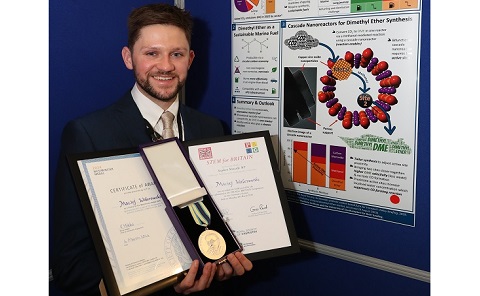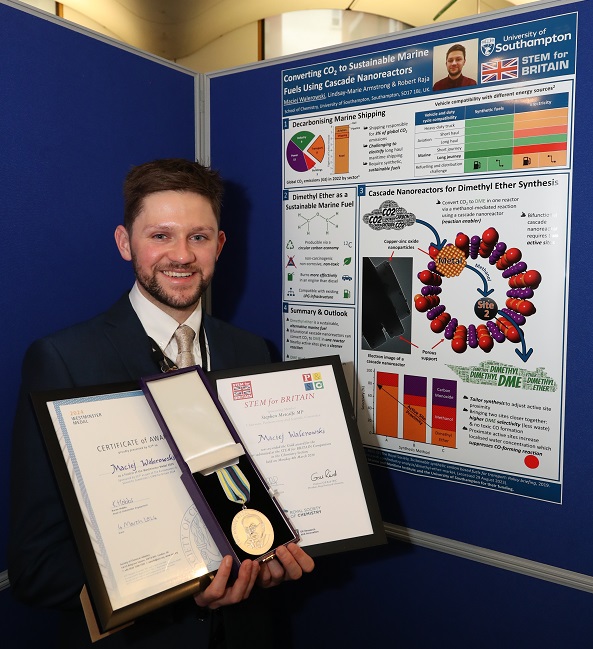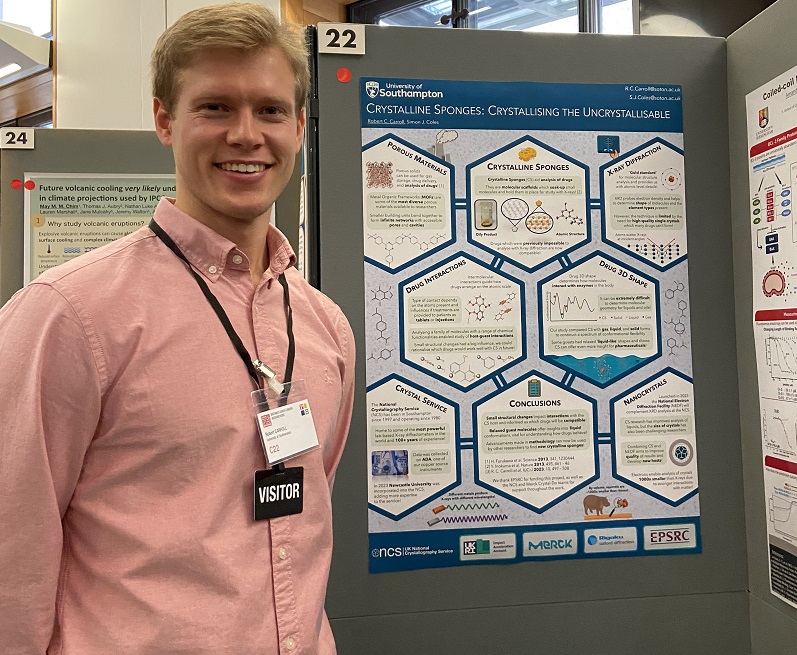Scientists take research to Parliament to win gold medal

Robert Carroll and Maciej Walerowski, PhD chemistry students, and Hugo Putuhena, a postdoc in engineering at the University of Southampton, attended Parliament to present their engineering and chemistry research to a range of politicians and expert judges as part of STEM for BRITAIN yesterday, with Maciej being awarded a gold medal by the panel of judges.
STEM for BRITAIN is a poster competition in the House of Commons – involving 120 early stage or early career researchers - judged by professional and academic experts, each winner receives a cash prize with a medal for the gold recipient. All presenters are entered into either engineering, biological and biomedical sciences, chemistry, mathematics and physics categories.

Professor Gill Reid from the University of Southampton, and also President of the Royal Society of Chemistry congratulated Maciej Walerowski (Postgraduate) for winning gold medal at the competition.
“We know that innovation in Chemistry is vital to bring forward solutions to the global challenges, including energy, sustainability, and the environment. Therefore, it’s increasingly important that researchers are able to communicate the essence of their work to a non-specialist audience – something Maciej has clearly achieved. I hope this success inspires him as he progresses in his research career both now and in the long term.”
Maciej added “I was absolutely thrilled to win the Chemistry Gold medal for my poster at the Stem For Britain event! Just being selected to present my research at this event was a huge privilege but winning gold was definitely a cherry on top! It was an amazing opportunity to showcase my research to a wider audience which I may not have had the chance to reach otherwise and I was able to take part in exciting discussions. I would highly recommend applying for this event as it gives a unique opportunity to share scientific research.”

Hugo's poster assesses finding suitable locations for future offshore wind to meet net-zero targets by 2050, while Robert’s poster showcases his research about advanced methods for analysis of pharmaceuticals with X-ray diffraction, both will be judged against dozens of other scientists’ research from across the country, in the only national competition of its kind.
On presenting their research in Parliament, Hugo said, “STEM for BRITAIN allows me as an early career researcher to engage with MPs, other policy makers and stakeholders who can influence policies related to offshore renewable energy. I hope that I can offer insights derived from my current research while also deepening my understanding of the policy making process.”

Robert added, “Coming to the end of my PhD I can present the full scope of the work I’ve undertaken, at scientific conferences this has helped me to interact with the wider community and improve my understanding of subject area. Now, the opportunity to bring this to MPs, and a more general audience, is a great way to engage even more people with the exciting research we’re involved with at Southampton”.
Stephen Metcalfe MP, Chairman of the Parliamentary and Scientific Committee, said:
“This annual competition is an important date in the parliamentary calendar because it gives MPs an opportunity to speak to a wide range of the country’s best young researchers.
“These early career engineers and scientists are the architects of our future and STEM for BRITAIN is politicians’ best opportunity to meet them and understand their work.”
The Parliamentary and Scientific Committee runs the event in collaboration with the Royal Academy of Engineering, the Royal Society of Chemistry, the Institute of Physics, the Royal Society of Biology, The Physiological Society, The Nutrition Society and the Council for the Mathematical Sciences, with sponsorship from Dyson, Clay Mathematics Institute, United Kingdom Research and Innovation, Warwick Manufacturing Group, AWE, the Society of Chemical Industry, Institute of Biomedical Science, the Heilbronn Institute for Mathematical Research, the Biochemical Society and the Isaac Newton Institute for Mathematical Sciences.
More on STEM for BRITAIN
Each category session will result in the award of Bronze, Silver and Gold certificates and cash prizes. The Gold winner will also receive a medal. There will also be an overall winner from the five sessions who will receive the Westminster Medal at a special awards ceremony in Parliament in April, organised by the Parliamentary & Scientific Committee.
STEM for BRITAIN was established by Dr Eric Wharton in 1997. Following his untimely death in 2007, the Parliamentary and Scientific Committee, with support from the Royal Academy of Engineering, the Royal Society of Chemistry, the Institute of Physics, the Royal Society of Biology, The Physiological Society, The Nutrition Society and the Council for the Mathematical Sciences, is working to further his legacy.
The event is made possible this year with financial support from Dyson, the Clay Mathematics Institute, United Kingdom Research and Innovation, AWE, Warwick Manufacturing Group, Society of Chemical Industry, Institute of Biomedical Science, the Heilbronn Institute for Mathematical Research, the Biochemical Society and the Isaac Newton Institute for Mathematical Sciences.
The competition is open to early stage or early career researchers, which includes university research students, postgraduates, research assistants, postdocs, research fellows, newly-appointed lecturers, part-time and mature students, returners, those people embarking on a second career, and their equivalent in national, public sector and industrial laboratories, and appropriate final year undergraduate and MSc students, all of whom are engaged in scientific, engineering, technological or medical research.
More info on STEM for BRITAIN